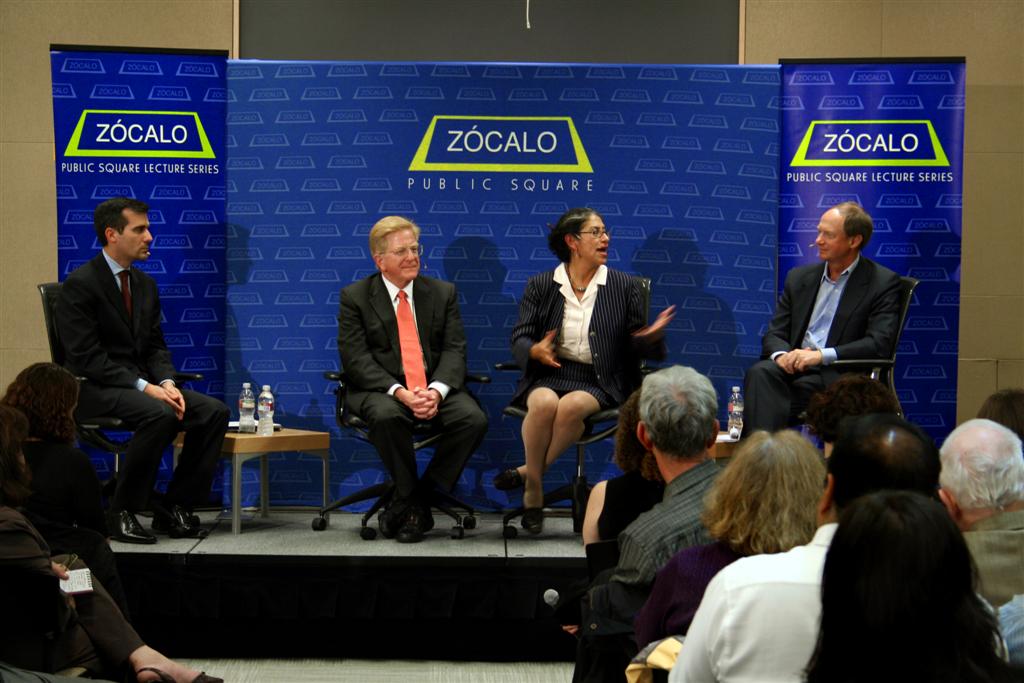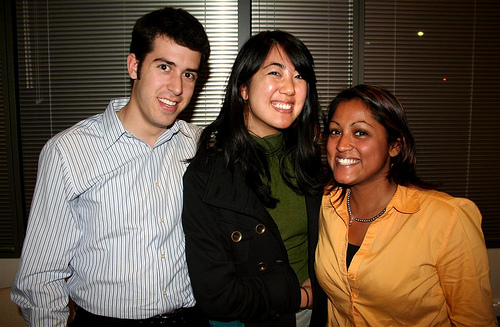
The only thing more closely watched than Barack Obama’s campaign might be his transition. Names are leaked, appointments rumored, appointees scrutinized (particularly of the former-candidate variety). And over 100,000 people want in.
“Is there anybody here who has not yet submitted their resume to Change.gov?” asked moderator Eric Garcetti, Los Angeles’ City Council President at RAND in Santa Monica, to a big laugh – and no raised hands.
Zócalo, along with the Center for American Progress Action Fund, invited three former Clinton administration officials experienced in making the transition from one government to the next – John Emerson, Maria Echaveste, and Rudy deLeon – to discuss the lineup so far, which key positions are still up in the air, and what all the horse-trading says about how the Obama presidency will run.
A team of rivals?
Obama is an avowed admirer of Abraham Lincoln, and of his biographer, Doris Kearns Goodwin, who postulated in her book that Lincoln succeeded by keeping his (former) enemies closer. With Hillary Clinton and Bill Richardson expected to be nominated as Secretary of State and Secretary of Commerce respectively, many have declared Obama’s administration another team of rivals.
 The panelists weren’t so sure. The three agreed that the choices represent intellectual depth and job experience. “This is a group of extremely experienced people. Smarts counts. Substance counts,” deLeon said.
The panelists weren’t so sure. The three agreed that the choices represent intellectual depth and job experience. “This is a group of extremely experienced people. Smarts counts. Substance counts,” deLeon said.
And that’s true, the panelists said, even of potentially controversial picks like Robert Gates, who has pursued the war Obama has opposed, Timothy Geithner, who some say shares the blame for bank bailouts and failures to bailout, and, as one audience member noted, Eric Holder, who was involved in Clinton’s pardon of billionaire Marc Rich.
In the case of Geithner, Emerson noted, the markets have already voted yes for the would-be Treasury Secretary. On Holder, the panelists thought that questions would arise during confirmation hearings, but that Holder would still be confirmed.
Obama, like Clinton before him, promised to bring an outsider’s perspective to Washington. But Clinton didn’t know when to say when. “One of the mistake our former boss made – God bless him – was in bringing in a lot of outsiders,” Emerson said.
Bring in the campaign troops
More commonly than hiring their competition, presidents hire their campaigners, who have two years of intense experience. But campaign vets tend to work on the White House staff, Emerson noted, like chief campaign strategist David Axelrod, who will become Obama’s senior adviser.
“He has to staff 3,000 or 4,000 positions,” Echaveste said. “You are going to find people who have been tried and tested.”
And, Echaveste added, appointing campaigners, who are often younger than former Democratic officials, gives “a chance to build a pipeline for future leaders of the country.”
Empty seats
When one audience member wondered whether this was a slow transition, Emerson noted that Franklin Roosevelt’s took months longer, and Bill Clinton had only begun to appoint his team a month after his win, while Obama already has several people in place, and the Center for American Progress has been building a blueprint for a year. But some important posts are still open, and some voices missing.
Emerson wondered where the Californians have gone, despite Javier Becerra’s assumed rise to trade representative. (Clinton had four Californians in his cabinet.) Echeveste noted that no Secretary of Labor has been announced, despite rising unemployment. Because finding the right person to handle a crisis is difficult, particularly since an appointee with experience in organized labor “doesn’t quite make sense,” Echeveste said she isn’t “surprised, just kind of concern,” at the open post.
The drill team versus Dr. No
DeLeon pointed out the absence of an energy secretary so far, and even absence of chatter about a position that requires an eye for national security, the economy, trade, and the environment. “In Washington we have two kinds of stories: we have rumors and we have leaks,” deLeon said for a big laugh. “Everything has generated a rumor except the energy job…. It’s complicated.”
“And they haven’t been able to convince Al Gore,” Emerson cracked.
The usual method, Echaveste said, would be to pick a person from an energy producing state or an energy industry (Garcetti offered up Sarah Palin, in merciful jest). DeLeon noted that most candidates fall into two camps: the drill team – who want to “deregulate everything” – and the “Dr. No world,” who want none of it.
In the hallowed halls
Once the team is in place, they’ll learn how decisions are made in the White House, and it’s not quite like “The West Wing,” according to the panel.
“We just didn’t make decisions walking down the hallway,” Echaveste said.
“But we were really clever with our repartee,” Emerson replied.
DeLeon agreed on the hall maneuver: “That was called a tackle. And tackles were prohibited.”
Echaveste described some more sober realities: “What you have are really really smart people trying to do a superhuman job.” That job involves sifting through mountains of information and trying to be proactive when each day can bring a new crisis – such as firefighters accidently putting Los Alamos National Laboratory at risk of being burned down, as DeLeon noted. “You learn how to process things simultaneously,”bl he said.
Day-today decisions don’t get to the president, Echeveste said. Only the toughest, most expensive, and most controversial questions rise to that level, though occasionally, as in the case of the Puerto Rican prisoner pardon for Clinton, controversies aren’t anticipated. Deputies handle the rest, and, as Emerson said, they “have a pretty good feel for what he’s going to want to be in on.”
After January 20, 2009
Audience members wondered whether the current roster of appointees signals that Obama will govern from the center, and what that means for progressive causes and humanitarian aid. Garcetti pointed out that the center has already shifted, with Rush Limbaugh taking Hillary Clinton’s appointment as a sign of centrism. Echaveste added, “I believe a President Obama understands that he is governing for the entire country. I don’t believe it’s fair to say that the Bush administration understood that or believed it.” Consensus already exists on key issues once considered left-of-center, like universal health insurance, or pursuing what deLeon called sustainable security in Afghanistan.
“I think the American people understand the hole we are in,” she said. “It’s going to take us at least eight years if not more to get us not just to where we were before, in 2000, but really to be ready for the 21st century.”
Relics of the Bush past
As one audience member noted, Bush is tenuring some of his appointees. It’s an easy fix for Obama, according to the panelists, who said he can undo it the day after inauguration if he wished, but that he should focus on his agenda.
“It’s best dealt with by the agencies. You can marginalize people,” Emerson said, to a murmur in the crowd. “It’s a shame, but it does happen.”
*Photos by Aaron Salcido.




Send A Letter To the Editors